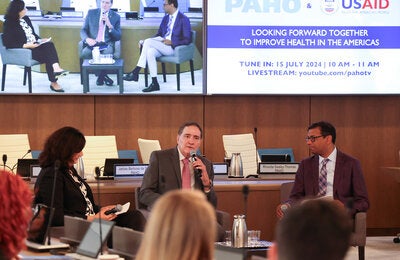

The Pan American Health Organization/World Health Organization (PAHO/WHO) and the General Conference of Seventh-day Adventists have agreed to work together to improve health in five PAHO priority countries—Bolivia, Haiti, Honduras, Guyana, and Nicaragua—through a new partnership aimed at enhancing both organizations' technical cooperation and support.
Washington, DC, 28 July 2011 (PAHO/WHO) — The Pan American Health Organization/World Health Organization (PAHO/WHO) and the General Conference of Seventh-day Adventists have agreed to work together to improve health in five PAHO priority countries—Bolivia, Haiti, Honduras, Guyana, and Nicaragua— through a new partnership aimed at enhancing both organizations' technical cooperation and support.
PAHO/WHO will provide technical guidance to the Church's local congregations and national ministries of health to establish and enhance community health centers with the overall aim of increasing access to primary health care. The Seventh-day Adventist Church will facilitate and establish academic links through its global network of universities and schools of public health and in Latin America and the Caribbean.

On 26 July 2011, Dr. Mirta Roses, Director of PAHO/WHO, and Ted Wilson, President of the General Conference of the Seventh-day Adventist Church, met at the Church's world headquarters in Silver Spring, MD, to form a unique partnership by signing a memorandum of understanding that strengthens and improves health initiatives in the Americas.
"Basing health systems on primary health care is the best approach for producing sustained and equitable improvement in the health of the peoples of the Americas," said PAHO Director Mirta Roses.
Under the new partnership, PAHO/WHO and the Seventh-day Adventist Church will work together to improve the promotion of health in priority countries and conduct joint visits to enhance technical cooperation and support. PAHO/WHO will also provide support and technical expertise during emergency situations such as the earthquake and the cholera epidemic that struck Haiti and the Dominican Republic in 2010.
The new collaboration is unique in that PAHO/WHO—a United Nations and inter-American agency specializing in health and focused on the regional and national levels— will partner with a Church that has 16,307,880 members in congregations worldwide, is active at the community level with an impressive network of hospitals, clinics, and schools, and works with ministries of health of PAHO/WHO member countries.
The Strategic Plan 2010-2015 of the Seventh-day Adventist Church calls upon its members to "Reach Up, Reach Out, and Reach Across." The plan calls for its members to reach "out to others as a friendly church that puts Christ's mission first, invites all peoples to fellowship and makes a difference daily in the community." One of the indicators of progress in this plan is the "percentage involved in community projects." This strategic tenet of the Church serves as the basis for a call by its General Conference to the congregations to make every church serve as a community health center six days per week while not being used as a house of worship on Saturday. PAHO proposes to work with the local congregations and national ministries of health in providing technical guidance in establishing and enhancing community health centers with the overall aim of increasing access to primary health care.
The Seventh-day Adventist Church originated in the 1840's in the United States as a church with the expectation of the second coming of Jesus Christ. It was formally established in 1860 by Dr. John H Kellogg, who built the Battle Creek Sanatorium and made health a priority for the Church. The Church works in 215 countries, with many health clinics started by individuals but eventually handed over to the Church. This network grew into 167 hospitals, 400 clinics, and 50 nursing schools established worldwide as well as 7,804 schools. Managing hospitals is complex and calls for special expertise, so the Church separated religious affairs from its health care systems. Starting in 1905, the Church founded schools to train nurses as well as the Medical Evangelist Medical Schools in Mexico and Argentina and Loma Linda University in California.
PAHO is the oldest public health organization in the world, with 109 years of operation, and serves as the Regional Office for the Americas of the World Health Organization. PAHO/WHO's expertise and experiences, coupled with the Seventh-day Adventist Church's years of service and presence in over 200 countries, will enhance the shared missions of both organizations and promote health in countries of the Americas.



